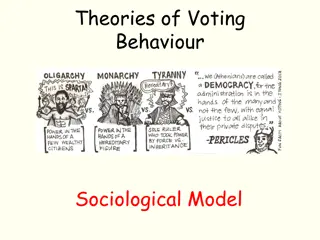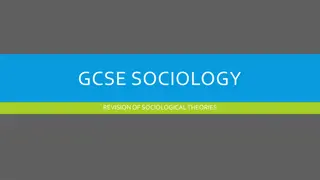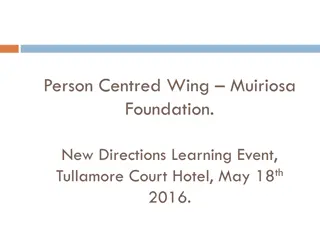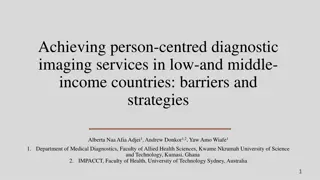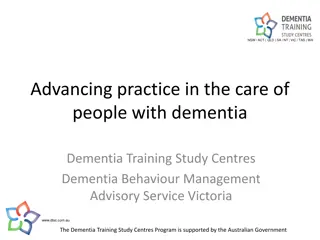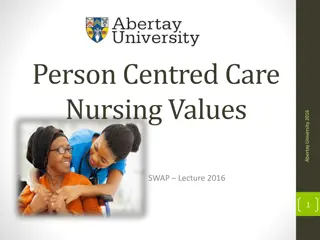Understanding Sociological Theories in Person-Centred Practice
Sociology provides explanations for social phenomena and trends that impact individuals and groups in society. This presentation introduces the definition of sociology, explores relevant theories for person-centred practice in social care and health, and discusses the importance of understanding societal influences on relationships and interactions in the context of social care and health services.
Download Presentation

Please find below an Image/Link to download the presentation.
The content on the website is provided AS IS for your information and personal use only. It may not be sold, licensed, or shared on other websites without obtaining consent from the author. Download presentation by click this link. If you encounter any issues during the download, it is possible that the publisher has removed the file from their server.
E N D
Presentation Transcript
Sociological theories and person centred practice This presentation introduces you to a definition and theories of sociology that are relevant to person centred practice in social care and health.
You will: Gain a definition of sociology Understand why sociological theories are relevant to person centred practice in social care and health Recognise the difference between theories and models Have an introduction to the theories of functionalism and conflict theory
What is sociology? Sociology seeks to provide us with explanations from a broad range of phenomena and social trends. Cunningham and Cunningham, 2014
Lets break this definition down Explanations are: The whys that emerge from society; for example, why can there be discrimination against particular groups of people in society, and what form does that discrimination take? Think back to your previous work on this module, e.g. equality and discrimination and a rights based approach.
Lets break this definition down Phenomena are : The what that goes on in society in terms of events and experiences that influence identified groups of people (e.g. groups with protected characteristics identified in the Equality Act 2010) as well as individuals within those groups
Lets break this definition down Social trends are: The identification of patterns in relation to social groups in society these may be identified by research, e.g. remember the Equality and Human Rights Commission (2015) Is Wales Fairer? report.
Why is sociology relevant to person centred practice in social care and health? We are all born into some form of social group and our experience of our social group and society as a whole shapes who we are and our relationships with others including those of us who need or/and deliver social care and health services.
Why is sociology relevant to person centred practice in social care and health? Sociology encourages us to challenge long standing and commonly held assumptions which can facilitate social change you will gain more insight to this when you have a look at the experiences of people with disabilities who campaigned for the social model of disability.
Why is sociology relevant to person centred practice in social care and health? Sociology encourages us to gain insight and an understanding of the challenges facing people in social care and health, e.g. poverty, social exclusion, substance misuse, youth offending and how issues may be linked, e.g. substance misuse, mental illness and poverty.
Before we move on to look at two sociological theories: You have previously explored the biopsychosocial model and considered models of communication. In this theme you will be looking at theories. Be aware that there is a difference between theories and models.
Theory: A theory can be defined as an interpretation of phenomena as experiences, events or happenings. Theories seek to generate understanding of why or how something is experienced but they are not absolute because they can be rejected or modified (Teater, 2014; Parahoo, 2014).
There can be: Grand theories (e.g. Marx s theory of social structure) Middle range theories (e.g. social care and health) Laws which are described as statements of cause and effect (Parahoo, 2014)
A model: A model can be defined as an interpretation of a theory and it may be presented in some form of structure (e.g. think of Thompson s (1997;2006) PCS (Personal, Cultural and Social) model). Models can both influence and be influenced by theory but they are not theories in their own right. (Teater, 2014; Parahoo, 2014)
Theories and models: It can be confusing when one looks at a theory compared to a model but the main thing to recognise is that theories and models differ to each other. Therefore it is important not to use the terms (theory and model) interchangeably, i.e. swap the term theory and model with each other because each have a different function in terms of informing policy and practice.
We will now move on to two sociological theories: Functionalism Conflict theory
Theory of Functionalism Authors associated with theories of functionalism include Emile Durkheim, Talcott Parsons, Herbert Spencer and Robert Merton. This theory regards society as a system of interdependent elements that need to harmonise to safeguard the survival and wellbeing of society. This theory is often compared to the human body where all parts interconnect and interact to maintain the overall human form.
Theory of Functionalism The theory of functionalism regards social institutions such as the family, education, economy and the political system as interdependent parts that need to have shared goals based on common values and expectations to maintain communities. This consensus of societal values and norms protects individuals but it also restricts and requires them to behave in certain ways.
Theory of Functionalism The theory of functionalism acknowledges that conflict in society exists but regards it as something to be resolved and if not, controlled for the smooth running of society. Functionalism is praised for identifying the interdependent elements of society but criticised for failing to recognise the immense diversity of values and resistance that exist within communities this challenges the idea of a passive and cohesive society.
Why is functionalism relevant to person centred practice in social care and health? This theory would regard social care and health organisations to be fulfilling specific functions to play a critical role in maintaining society. This role can be seen to be supporting individuals to fit back into society so that they are not considered to be deviant, outside society, or/and not complying with social expectations, e.g. mental illness, substance misuse, youth offending, child neglect.
Why is functionalism relevant to person centred practice in social care and health? This theory situates people who work in social care and health services in positions of power, and this power has been endorsed via the norms and values of society. This is relevant to person centred practice because it encourages us to explore issues around power in social care and health as regards who holds it and how they use it when working with individuals.
Conflict theory: Marxism The seminal author associated with conflict theory is Karl Marx (1818-83 quoted in Cunningham and Cunningham, 2014). Conflict theory regards society as being characterised by conflict and power struggles where one group seeks to have dominance over another and at the other s expense.
Conflict theory: Marxism There is the concept of oppressing and oppressed classes and ongoing struggles between them. These power struggles are considered to result in extremes of wealth and poverty which generate conflict and a need for social change this theory challenges beliefs that poverty and inequality are inevitable aspects of society owing to the survival of the fittest.
Conflict theory: Marxism There is the concept of oppressing and oppressed classes and the ongoing struggles between them. These power struggles are considered to result in extremes of wealth and poverty which generate conflict and a need for social change this theory challenges beliefs that poverty and inequality are inevitable aspects of society owing to the survival of the fittest.
Conflict theory: Marxism Marx contended that institutions in society (including social work, social care and health) played an important role in maintaining people s acceptance of their lot without challenging inequality in society. This theory has been praised for challenging the idea that we live in a passive society but criticised for focusing overly on economic forces as determining one s position in society when other issues e.g. gender, race, disability have been equally significant in terms of people s oppression.
Why is conflict theory relevant to person centred practice in social care and health? Marx regarded people working in social care (social workers) as contributing towards the social control and surveillance of people who are some of the most marginalised in society the same can be applied to social care and health workers. This theory is useful to person centred practice because, similar to functionalist theory, it encourages us to explore the use of power in social care and health services in terms of who has it and how they use it in relation to people who require services.
In summary sociological theories have influenced social care and health because they: Provide insights into how society both influences and is influenced by the lives of individuals and their sense of identity Encourage us to explore the social values and norms of society and how individuals are expected to fit into them but can challenge them Prompt us to recognise the position of power in social care and health and how it is used Show how conflict appears to be an inevitable prerequisite to change including social justice and people s rights
References Cunningham, J. and Cunningham, S. (2014) Sociology and social work. 2nd edition. London : Learning Matters/SAGE. Teater, B. (2014) An introduction to applying social work theories and methods. 2nd edition. Maidenhead : Open University Press Parahoo, K. (2014) Nursing research: principles, process and issues. Basingstoke, Hampshire: Palgrave Macmillan.







